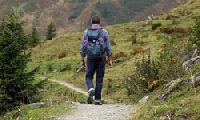
Be prepared and enjoy your trip!
Whether it?s a day hike or a multi-day expedition, items to bring on your trip are essentially the same. For longer hikes, you just need a few more key elements ? food, water, toilet paper, etc. Otherwise, there are about 10 must-haves for your hike. Here?s how it breaks down:
Navigation
Navigation items are always a must. Have a waterproof map of your location, a compass, and a watch. Leave an itinerary of where you plan to hike with a friend or family member in case of emergency. A GPS is an option, but it?s no replacement for a map and compass. Batteries die and satellites aren?t always accurate. But a map, a compass, and a watch have been used to navigate for centuries.
Sun and bug protection
Yes, a hat, sunscreen and sunglasses are all great items to wear and bring. Did you know that sun-blocking clothing is available? Manufacturers are beginning to make clothing lines that block harmful UV rays.
As an added bonus, much of the clothing wicks moisture, dries quickly, is comfortable and durable. There is even clothing with built-in bug protection. That said, it?s still a good idea to bring along bug repellent with you.
~
Clothing
It may seem silly to bring clothing with you on a day hike, but preparedness saves more lives than a lighter backpack. In addition to the clothes you are going to wear, pack a lightweight rain coat. It?s not just for rain ? it can be used as a layer for warmth if you get caught out at night. If you are hiking in an area with wide swings in temperature, make sure to have a longer sleeve shirt or fleece jacket for warmth.
Food and cooking
Dehydrated foods naturally weigh less, making them excellent options for hikers. Many outdoor supply stores carry a wide variety of foods from breakfast and snacks to dinner and dessert. Carry enough water with you to cook up your favorite foods in addition to the water you will drink.
Speaking of cooking, look for a mess kit that doubles as cooking and eating utensils. Often a pot is also a bowl and the lid doubles as a plate. Multi-duty items are your friends, as they cut down on the number of things you need to bring.
Safety
Always have a sharp knife and a first-aid kit with you. Consider a multipurpose knife that has scissors and other useful tools. Duct tape and rope or an extra shoelace will also come in handy. Fire and light fall under the heading of safety, too. Make sure to have some kind of tinder and matches or a magnesium fire starter. Not only will you be able to cook, you can make a signal fire, if necessary.
A headlamp or quality flashlight will help you see after dark or in the fog. Headlamps with LED lights are especially handy, as you can wear it while keeping your hands free.
Shelter and protection
If you are planning an overnight adventure or get caught out for some reason, you?re going to want to have some sort of shelter. A tent is one option and many are very light and compact. Another idea is having a tarp, rope and tent stakes. If you hike with trekking poles, these can double as tent poles. Space blankets or sleeping bags will keep you warm at night and provide some insulation from the ground.
Other items
If you hike in an area with mosquitoes or other biting bugs, consider packing a portable mosquito net to cover your head at night. Chlorine tablets for purifying water may come in handy, in the event that something happens to the water you?re bringing or you have to refill in an emergency.
If you are hiking in a remote wilderness area by yourself, consider investing in a personal locator beacon. Many let you message a friend or loved one with your GPS coordinates and let them know that everything is okay. They also let you contact search and rescue (SAR) if something goes wrong and you need help.

